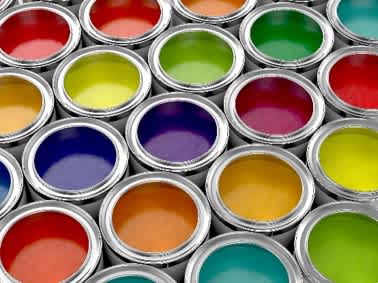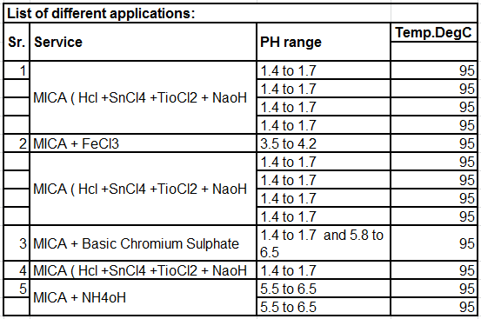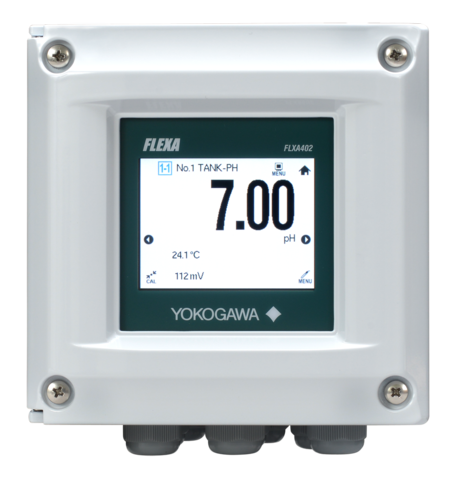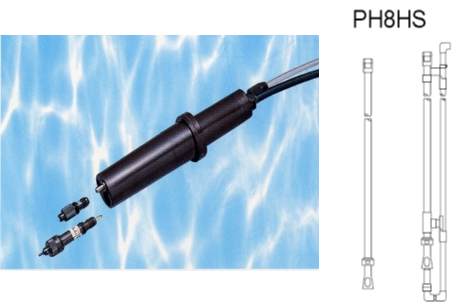Introduction
Pigment producer manufacture produces pigments to supply to paints, plastics, inks, construction, textile and cosmetics manufacturers etc. The pigments come under wide range - general purpose grades, high performance, and specialist hard-to make colours and effect pigments.

Pigments and chemicals form an intrinsic part of many industries. They serve as raw materials in the manufacturing of Plastic, Rubber, Paint, Paper, Textile, Tiles, Detergent Powder and Soaps, Inks, and Photo Films etc.
Pigments come in a wide variety of colours and some are water-soluble. For these reasons, many of these compounds have been produced, isolated, and characterized.
Among the most important variables affecting processes, pH and temperature are environmental conditions with a strong effect on the pigments. Thus, it is very important to control them in industrial bioprocesses.
Balancing the pH
The degree of acidity or alkalinity of a solution, known as pH, is measured from 0 to 14. Acid solutions measure 0 to 7. Alkaline (smells like ammonia) solutions measure 7 to 14. Pure distilled water measures 7. There are instruments to measure pH, or you can rely on sense of smell. The binder should have a slight ammonia odor. We are shooting for a pH range of 8.0 to 8.8. The acrylic polymer used to make paint becomes unstable at a pH below 7.5. Adding a dispersion may lower the pH below the optimum range. Also, adding thickeners will typically lower the pH. If polymer binder starts looking and acting like cottage cheese then chances are pH is too low. Try raising the pH to salvage the batch. Do this with the drop-wise addition of Ammonium Hydroxide (NH4OH) while mixing. If the mixture does not respond to the pH correction, allow it to dry out for disposal.
Controlling Viscosity and Rheology
Thickness or viscosity is generally well understood. Rheology usually bears a bit of explanation. Long rheology refers to a stringy, resinous, quality, like that of honey. Industrial enamels and automotive paints often exemplify these qualities. Short rheology refers to a smoother, less "ropy" paint formulation, typical of what acrylics and oil paints are known to be. To create different rheologies, you can choose the appropriate gel or medium to combine with the dispersion. These are pH sensitive polymers that swell up when the paint's pH is 8.0 - 9.5 (It is critical to keep the paint in this range.)
Ammonia is used to maintain the pH in the acceptable range. Ideally, this is determined with a pH meter, and is characterized by a slight ammonia odor. You will feel the mixture get thicker as you proceed. (If you are getting chunks it may be a result of adding the Thickeners too quickly or insufficient mixing.) Blend until the mixture is smooth and of the desired thickness.
Typical Process details as an example:

Typical problems
- What is the concentration of these chemicals?
- Customer may say it is difficult to give concentration of these chemicals.
- What is the process pressure?
- Process pressure: atmospheric pressure
- Calibration frequency
- Once in a day. Customer has observed drift of @1 PH every day i.e. why calibration is done daily.
- Scaling?
- Yes scaling shall be observed on electrode
- CIP/SIP
- No.
- Typical sensor life @1 1/2 months to max. 2 months
- Process temp.
- varies from -5 to +105 deg C, typical batch process temp. will be 95 degC (changes from manufacturer to manufacturer)
Remedies
- Use sensor with most chemically resistant Ryton body.
Product Recommendation
Measurement System
Process Liquid Analyzer:
- 2-wire FLEXA pH/ORP Analyzer

Features
- Dual sensor measurement on 2-wire type analyzer
- Indication of sensor wellness
- 4-wire FLXA402 pH/ORP Analyzer

Features
- Connectable to up to five sensor
- Easily viewable color LCD
- Touch screen operation
Sensor Selection:
pH immersion fitting like PH8HS / equivalent with PH8EFP sensor.

Features
- With the body made of Ryton, a strong engineering plastic, which is comparable to Teflon in terms of corrosion resistance and heat resistance, it allows for a wide range of applications.
- The integrated-sensor design simplifies calibration with standard solutions and maintenance.
- The pH glass electrode of a pH sensor, the platinum or gold electrode of a ORP sensor and junction can be individually replaced.
Tangible benefit
More reliable and accurate analysis of pH which helps to improve end product quality and total operation cost is less.
Note: For additional information on this application contact the local Yokogawa Process Liquid Analyzer Department
Industrias Relacionadas
-
Química
Las plantas químicas dependen de procesos de producción continua y por lotes, cada una de los cuales impone diferentes exigencias para un sistema de control. Un proceso continuo exige un sistema de control robusto y estable que no falle y provoque el cierre de una línea de producción, mientras que en un proceso por lotes el énfasis se centra en tener un sistema de control que permita una gran flexibilidad para realizar ajustes a fórmulas, procedimientos y otros elementos. Ambos tipos de sistemas necesitan ser administrados en el historial de calidad del producto disponible, así como tener la capacidad de ejecutar operaciones no rutinarias. Con el respaldo de su extenso portafolio de productos, un equipo de experimentados ingenieros en sistemas y una red global de ventas y servicio, Yokogawa ofrece una solución para cada proceso productivo.
-
Productos a base de químicos
Yokogawa ha estado sirviendo al mercado de productos químicos a granel globalmente y ha obtenido reconocimiento como líder en este mercado. Con productos, soluciones y especialización en la industria, Yokogawa entiende su mercado y las necesidades de producción y trabajará con usted para proporcionarle una solución confiable y rentable durante el ciclo de vida de su planta.
Productos y Soluciones Relacionadas
-
2-Wire Transmitter/Analyzer FLXA21
The FLEXA™ series analyzers are used for continuous on-line measurements in industrial installations. With an option for single or dual sensor measurement, they are the most flexible two-wire analyzer available.
-
Conductivity Analyzers
Maintain and control even the most demanding process applications
-
Conductivity Sensors
Measure aqueous solutions quickly and reliably
-
Immersion Holder FD20
The immersion fittings are designed for either pH or ORP (Redox) measurements in tanks, open vessels and drains. They have a "hoisting cable" for easy maintenance.
-
Liquid Analyzers
Increase process optimization and control
-
Multi Channel 4-Wire Analyzer FLXA402
Available in single or multi-sensor measurement
-
pH and ORP Analyzers
Optimize field maintenance, calibration, and system configuration
-
pH and ORP Sensors
Ensure fluid process operations
¿Tiene Dudas?
Contacte a un Experto de Yokogawa y conozca como podemos ayudarle a resolver sus retos.